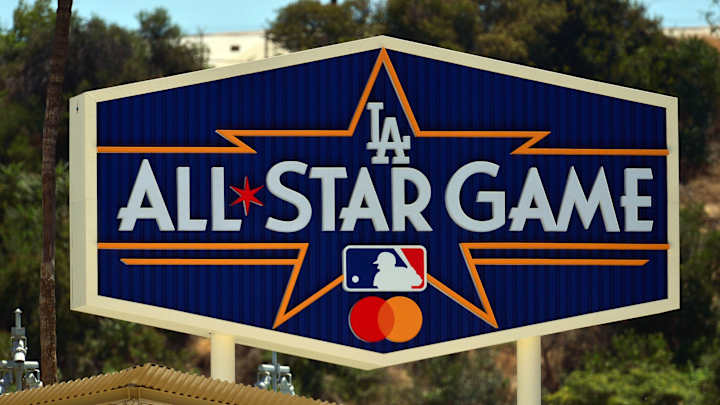The Dodger Stadium All-Star Game That Wasn't And The One That Was

We're smack dab in the middle of the All-Star break. Kinda of feels like we ought to be debating which pitchers the Dodgers aren't going to trade for this time of year, doesn’t it?
Or, we would be if not for COVID-19. We’d also have basked in the glory of the Home Run Derby Monday and enjoyed several days of festivities culminating with the Midsummer Classic at Dodger Stadium tonight at 5:07 p.m.
Alas, we have missed the once-in-a-lifetime exhileration of the All-Star Game in Los Angeles; the first such celebration since 1980. It’s not as rare an occurrence in some markets, however. San Diego, home of the expansion Padres for example, hosted three ASGs in a space of 38 years between 1978 (where the locals booed Steve Garvey as he accepted the MVP trophy after the game) and 2016.
But such is life and the cancellation of this year’s event is nobody’s fault. I’m just feeling the weight of the situation for a moment as it relates to baseball, which is my life. And I’d sure like to be at the ballpark this very minute, preparing for game.
[Follow Sports Illustrated’s Inside the Dodgers on Twitter.]
Per Major League Baseball, the Dodgers have already been awarded the 2022 All-Star Game, which is genuine consolation. And since we can always look back at the other ASGs in Los Angeles this afternoon, let's do so now.
The 1980 All-Star Game was played Tuesday, July 8 at Dodger Stadium, with 56,088 in attendance, including one giddy me. The final totals were as follows: Four runs, seven hits, no errors for the National League; two runs, seven hits and two errors (both by Willie Randolph) for the American League. Dodgers' ace Jerry Reuss (who struck out all three batters he faced in the sixth) the winner and Yankee Tommy John the loser. Home runs by game MVP Ken Griffey, Sr. for the NL and Fred Lynn for AL.
Other Dodgers to appear in the game were leadoff man and second baseman Davey Lopes (0-1), Reggie Smith (0-2), who started in center, first baseman Steve Garvey (0-2), shortstop Bill Russell (0-2) and pitcher Bob Welch, who followed starter J.R. Richard and allowed two runs on five hits, with a walk and four strikeouts in three innings of work.
Steve Stone, in the midst of his out-of-nowhere career Cy Young season, started for the AL and went a perfect three. Bruce Sutter pitched the eighth and ninth for a two-inning save for the winners. Ten pitchers were used in the game. Total, by both sides. By way of contrast, 18 were used in the 2019 Midsummer Classic, with no one man pitching more than an inning.
You can watch the entire affair below:
What you may not know is that in four seasons from 1959 to 1962, the league hosted two All-Star Games, separated by two days to three weeks on the calendar. One of those games was played at the Los Angeles Memorial Coliseum, on Monday, August 3, 1959.
The Americans won that one, 5-3 in a 1:00 p.m. game in front of 55,105. Baltimore's Jerry Walker started and went three innings, allowing a run on two hits for the win and was followed by Early Wynn, Hoyt Wilhelm, Billy O'Dell and Cal McLish, whose full name was Calvin Coolidge Julius Caesar Tuskahoma McLish. Really.
Batting highlights for the winners included a 2-4 day for Nellie Fox, a two-run home run by Yogi Berra and solo homers by Frank Malzone and Rocky Colovito.
Don Drysdale started and took the loss for the NL, allowing three runs on four hits, with three walks and five strikeouts in three innings. He was followed to the mound by Gene Conley, Sam Jones and Roy Face, who went two innings each. Cincinnati's Frank Robinson recorded three of his team's six hits, including a solo homer off Wynn in the fifth.
Hank Aaron went 0-3, Willie Mays 0-4, Ernie Banks 0-4 for the losing squad. Slackers. Following the defeat, the NL would go on to win the next five ASGs and 19 of 20. Those were the days for the Senior Circuit, weren't they?
And remember, glove conquers all.
Howard Cole has been writing about baseball on the internet since Y2K. Follow him on Twitter.

Howard Cole is a news and sports journalist in Los Angeles. Credits include Sports Illustrated, Forbes, Rolling Stone, LAT, OCR, Guardian, LA Weekly, Westways, VOSD, Prevention, Bakersfield Californian and Jewish Journal. Founding Director, IBWAA.